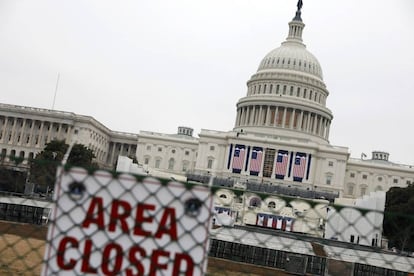Trump against Europe
The incoming US president is straining transatlantic relations
Not a day passes without some sign that Donald Trump’s mandate is going to put transatlantic relations to the test. After firing off volleys against Mexico and China, which he has singled out as trade enemies and threatened with punitive import tariffs, the incoming president has launched a tough attack against the European Union and NATO.

He has described the former as a failed project, recommending its member states follow the United Kingdom’s example and abandon it. The second is an “obsolete” organization whose time has passed. Trump argues that the European Union was created to compete commercially with the United States and has promised that as soon as he takes office he will offer the United Kingdom a preferential trade deal. In both cases he shows a worrying and dangerous lack of knowledge both about the reality of Europe as well as of the benefits that the EU has brought, and continues to bring, by creating a shared, open, safe, free and prosperous transatlantic space.
But it is not just Trump’s ignorance that is of concern (however much he wants to help British Prime Minister Theresa May to effect Brexit as quickly as possible, the United Kingdom cannot sign any trade deals until it has formally left the EU, an event that could be up to two years down the road). He has also blamed the EU, and Germany in particular, for having provoked Brexit by inundating Britain with Syrian refugees. This is absolutely untrue. Since the beginning of the Syrian crisis, London has shown little solidarity and refused to engage with the principles of the EU in this regard.
Donald Trump shows a worrying and dangerous lack of knowledge about the reality of Europe
He has criticized German chancellor Angela Merkel’s asylum policies, threatened to impose import tariffs of between 30% and 35% on BMW vehicles if the company goes ahead with its investment plans in Mexico (Trump has already managed to get Ford to pull out of a planned $1.6 billion investment in San Luis de Potosí) at the same time as praising Russia’s Vladimir Putin and calling for sanctions on Russia to be lifted. In short, the outlook for Europe does not look rosy. What’s more, Trump has said that he intends to immediately impose tougher visa requirements on EU citizens, all of which points to a transatlantic agenda that is likely to be filled with friction and discord.
Obama understood that a united Europe served US interests better than a divided continent. That is why he called on UK voters to remain in the EU and to fight to improve it. We now have a president in Washington who sympathizes with Europhobes, wants to encourage division and is ramping up tension across the Atlantic. Europe can no longer ignore the evidence or hope simply that all of this comes to nothing. It needs to express loudly and clearly its concerns about how Trump sees the continent and the direction of transatlantic relations he is outlining and send a message to his administration as to its determination to act in defense of European interests.
English version by Nick Lyne.
Tu suscripción se está usando en otro dispositivo
¿Quieres añadir otro usuario a tu suscripción?
Si continúas leyendo en este dispositivo, no se podrá leer en el otro.
FlechaTu suscripción se está usando en otro dispositivo y solo puedes acceder a EL PAÍS desde un dispositivo a la vez.
Si quieres compartir tu cuenta, cambia tu suscripción a la modalidad Premium, así podrás añadir otro usuario. Cada uno accederá con su propia cuenta de email, lo que os permitirá personalizar vuestra experiencia en EL PAÍS.
¿Tienes una suscripción de empresa? Accede aquí para contratar más cuentas.
En el caso de no saber quién está usando tu cuenta, te recomendamos cambiar tu contraseña aquí.
Si decides continuar compartiendo tu cuenta, este mensaje se mostrará en tu dispositivo y en el de la otra persona que está usando tu cuenta de forma indefinida, afectando a tu experiencia de lectura. Puedes consultar aquí los términos y condiciones de la suscripción digital.








































